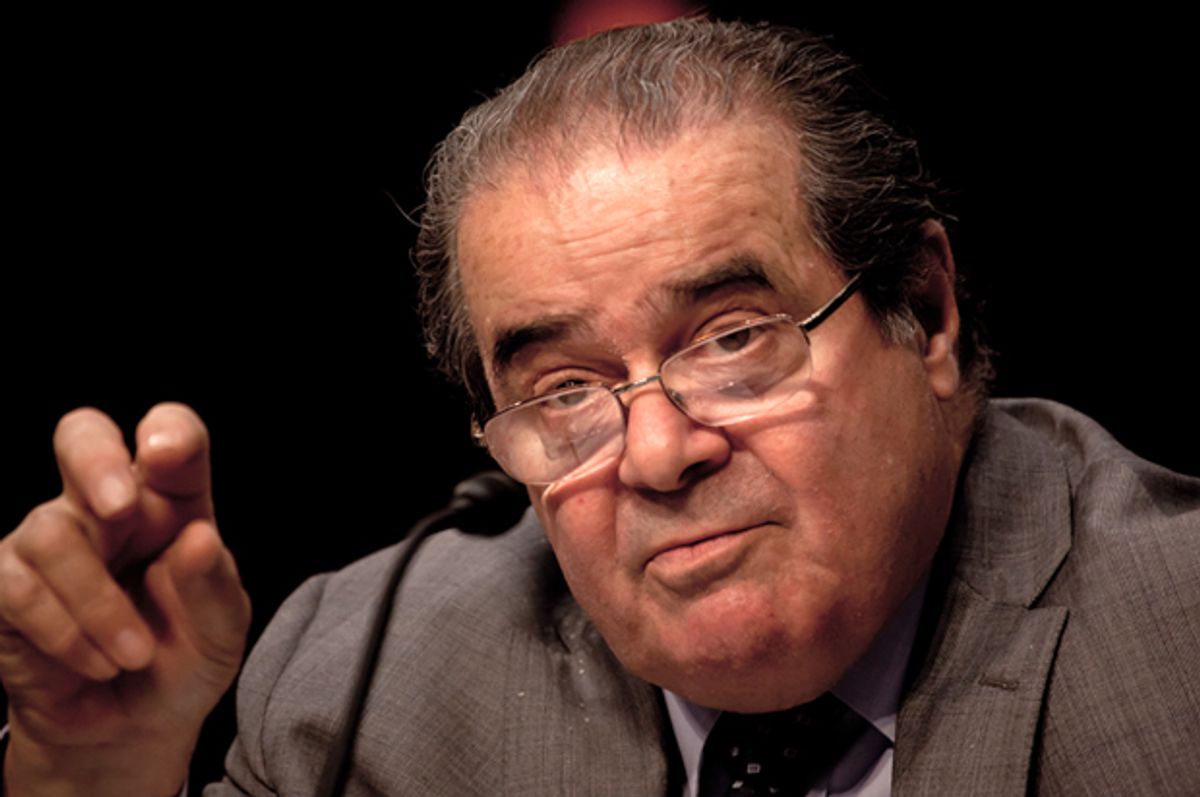It is only fitting that with the passing of Supreme Court Justice Antonin Scalia, one of the greatest hypocrites of the modern era, Republican partisans who similarly proclaim strict adherence to the Constitution and its “original intent” now plan to obstruct the President of the United States in carrying out his constitutional duty.
Shortly after the announcement of Scalia’s death on Saturday, Senate Majority Leader Mitch McConnell released a statement asserting that the Justice’s seat should not be filled until 2017, by the newly elected president -- who McConnell is praying will be Republican. Other GOP politicians quickly followed suit at Saturday's GOP debate. “The next president must nominate a justice who will continue Justice Scalia’s unwavering belief in the founding principles that we hold dear,” said Sen. Marco Rubio. Retired neurosurgeon Ben Carson didn’t even bother disguising his partisan motive: “Given the dire condition our democracy currently finds itself under Obama’s ideological agenda, I call on the Senate to stop any attempts to fill this crucial seat until We The People elect a strong Constitutionalist this November.” (One can only assume that if another Democrat is elected by We the People, Carson will call on the Senate to obstruct for another four years).
Massachusetts Senator Elizabeth Warren was quick to respond to McConnell and his fellow Republicans:
“Senator McConnell is right that the American people should have a voice in the selection of the next Supreme Court justice. In fact, they did — when President Obama won the 2012 election by five million votes. Article II Section 2 of the Constitution says the President of the United States nominates justices to the Supreme Court, with the advice and consent of the Senate. I can't find a clause that says '...except when there's a year left in the term of a Democratic President... Abandoning the duties [Republican senators] swore to uphold would threaten both the Constitution and our democracy itself. It would also prove that all the Republican talk about loving the Constitution is just that — empty talk.”
Empty talk, indeed. Like the soon-to-be deified Justice Scalia, modern conservatives talk a lot about the Constitution, and posture themselves as the founding fathers philosophical descendants. And like Scalia, most conservatives are full of it. When it comes to the “originalist” principles that Scalia promoted -- sold as non-partisan and politically neutral --well, they are mostly illusory.
The most infamous case revealing Scalia’s partisan hypocrisy was Bush v. Gore, which handed George W. Bush the presidency after the court prevented the state of Florida from recounting its undervotes. (Months later, a media study found that Bush would have likely won a recount of the undervotes, though Gore would have probably won a statewide recount). The 14th amendment’s equal protection clause was used to justify shutting down the recount, claiming that the state’s electoral precincts had failed to apply common standards for counting votes. However, as Robert Parry pointed out in 2011, it’s safe to assume that the drafters of the 14th amendments equal protection clause, which was passed to guarantee equal rights for freed slaves, never intended for it to protect a “white man like George W. Bush from possibly losing an election in Florida in 2000.”
Original intent is, of course, a fundamental tenet of Scalia’s originalist doctrine, and years after Bush v. Gore, he unintentionally revealed his own hypocrisy in an interview with the legal magazine California Lawyer, while discussing gender discrimination and the equal protection clause:
“In 1868, when the 39th Congress was debating and ultimately proposing the 14th Amendment, I don’t think anybody would have thought that equal protection applied to sex discrimination, or certainly not to sexual orientation. So does that mean that we’ve gone off in error by applying the Fourteenth Amendment to both? Yes, yes. Sorry to tell you that.”
When it guaranteed the election of a Republican, original intent was seemingly disregarded; when it came to gender discrimination or LGBT equality, one had to consider what those nineteenth century gentlemen really had in mind.
This kind of dishonest masquerading has become the norm for Republicans. Notice, for example, how most GOP leaders called for “the people” to have a say in deciding Scalia’s replacement. (Forget the fact that “the people” elected Obama in 2012 by a wide margin, as Warren noted.) Suddenly, after leading the way in gerrymandering and voter suppression, Republicans are now the foremost defenders of American democracy. For the people’s champion, Senator McConnell, this is a stark change in attitude from a little over a year ago, when he was running for reelection in Kentucky and sent out intimidating and fraudulent “ELECTION VIOLATION NOTICE” mailers to residents of Democratic districts, claiming they were “at risk of acting on fraudulent information.”
After three decades of serving on the Supreme Court, Scalia leaves a divided America and a Republican party that has only just begun to live up to his vulgarity. As Corey Robin writes: “If you want to understand how Donald Trump became the soul of the Republican Party, you need look no further than Antonin Scalia. Scalia is the id, ego, and super-ego of modern conservatism.” And so his legacy lives on.


Shares